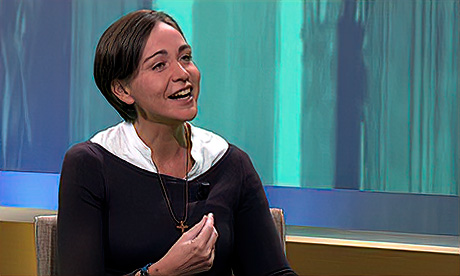One of France’s most popular news and information magazines, Paris Match, has published a series of secretly taken photographs of Archbishop Michel Aupetit in the company of a young woman as part of an article titled “Lost for Love”.
Pope Francis on December 2 accepted the 70-year-old Aupetit’s resignation as Paris’ archbishop after rumours intensified over a consensual relationship he had with an adult woman back in 2012.
The archbishop acknowledged the “ambiguous” nature of that relationship, but he’s denied any sexual involvement with the unidentified woman.
But a week after the pope relieved Aupetit of his duties, Paris Match published photos of the archbishop dining and strolling through an area just outside of Paris with a 46-year-old Belgian theologian and consecrated virgin named, Laetitia Calmeyn.
In this exclusive interview with La Croix’s Céline Hoyeau, she says the incident has a lot to do with the way many people view women in general and those involved in Church leadership.
La Croix: You appeared in an article in Paris Match on Thursday… It’s the first time that a female theologian, a consecrated virgin in the Church, has been the object of such media treatment.
Laetitia Calmeyn: Two days ago, I was really shocked, I experienced it as a trauma. And then a question came to me: if it had been a man, a priest, at Archbishop Aupetit’s side, would there have been the same treatment from the media?
Should women in the Church be reduced to objects of suspicion, fantasy, an expression of jealousy or servility? Does all this mean that, in the Church and in the eyes of the world, a relationship between a man and a woman that is lived in friendship is unthinkable?
I can fully accept that journalists want to meet me, but this theft of images and this editing to suggest suspicions — when there is no substance! — is terrible.
Some people may have reproached you for a form of imprudence in this walk with a bishop who had just resigned when he was suspected of an affair with a woman.
We must distinguish between prudence and mistrust.
As you could see from the photos in Paris Match, all the spaces were public spaces.
That someone who has recently been treated extremely badly should make room for friendship to get through the ordeal is part of the ABCs of faith. We must not make a mistake about that.
Where is the scandal today? Certainly not in friendship, but in the evil projected onto this friendship.
We must return to the objectivity of my situation.
What are my missions in the diocese? I am a teacher at the Notre Dame faculty of the Collège des Bernardins, and I am the director of the ISSR (Institut Supérieur des Sciences Religieuses). I sit on the council of the Paris seminary.
But I am not part of the team that accompanies Michel Aupetit in his governance. In one year, I went to the archbishopric once for a birthday.
There are priests who have important responsibilities in the diocese. Do people say to themselves, “Look, there is a man of power”?
I am far from being the only woman; there are others in the diocesan councils. And if I am sometimes consulted by priests or laypeople on one or another issue, it is in the name of my theological competence.
There is much talk about the place of women in the Church. To me, it seems very important that it is not only in a hierarchical relationship but also as colleagues. I have experienced this in the seminary: a woman’s view is completely different from that of a man.
I am not in favour of quotas for women in the Church. That is not the issue. There is a necessary female perspective, but it is linked to charisms.
Women with responsibilities at the Bernardins are rare. Doesn’t being alone in a world of priests run the risk of participating, oneself, in a clerical system?
At the Bernardins, there are more and more of us… So, if I follow your reasoning, we would no longer be involved, for fear of participating in a system.
I have found that clericalism, in part, is very unconscious. But what I also experience on a daily basis is that fraternity and friendships move things and make it possible to live real relationships of communion.
The question of the place of women is important so that men can also find their place as men, without necessarily identifying with their function.
What follow-up do you intend to do?
Personally, it is to be faithful to my consecrated life following Christ and to my mission. But this fidelity does not exclude a duty of justice.
Lawyers are exploring legal avenues. There will be a complaint.
But we have not yet precisely defined the subject of this complaint: invasion of privacy, defamation, slander… We must avoid this happening again.
Will you continue your mission at the Bernardins and at the Congregation for the Doctrine of the Faith?
Yes, I am deeply happy there.
- First published in La Croix International. Republished with permission.
